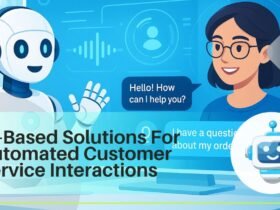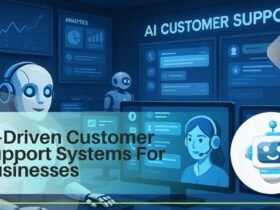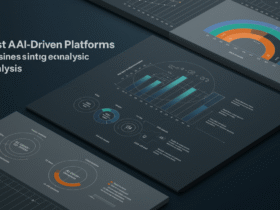Launching a tech startup can be a rather challenging process as the scope of competition is high and the technological spheres are changing continuously.
The ability to maximize resources, work more efficiently, and grow operations without going bankrupt is probably one of the most important components of a startup founder to consider. It is here where Artificial Intelligence (AI) could be extremely instrumental.
The technology of artificial intelligence can make the competition between tech startups fair by providing them with the tools usually used by bigger businesses.
Pricing is however an essential issue to start ups that have small budget cushions to work with.
Why AI is Important for Tech Startups?
Artificial Intelligence is not a concept anymore that is expected to become available in the future but a reality that can give startups a competitive advantage today. An increasing number of startups have acquired AI tools to automate routine tasks, analyze big data files, and forecast the future, all of it potentially saving them a lot of time and resources.
Another popular use of AI is its power to help optimize marketing and improve customer experiences and the ability to even help develop products.
In the case of tech startups, AI is a matter of survival in the highly competitive marketplace, more so, it is a matter of the cutting edge innovation. The implementation of AI can be helpful in various aspects, some of them being:
-
Automation of Repetitive Tasks: Startups often struggle with resource constraints, so automating tasks like data entry, customer support, and email marketing can free up valuable time.
-
Data-Driven Decisions: AI tools can analyze vast amounts of data, offering insights that help businesses make informed decisions quickly, leading to better outcomes.
-
Customer Personalization: AI can be used to segment customers, predict their needs, and tailor products or services accordingly, boosting customer satisfaction and loyalty.
Key Features to Look for in Affordable AI Software for Startups
By analyzing the use of an AI tool in a startup you need to start by considering software that falls within your budgetary capacity but is capable of great power. Some main features to be considered are as follows:
| Key Feature | Explanation |
|---|---|
| Scalability | Ensure the software can grow with your business needs as your startup expands. |
| Ease of Use | Choose software that is user-friendly and does not require specialized technical knowledge. |
| Customization | Look for tools that can be customized to suit the unique needs of your business. |
| Integration | The ability to integrate seamlessly with other tools you’re already using is crucial. |
| Affordability | Pricing models should be transparent, with clear pricing tiers or free trials to accommodate a startup’s budget. |
| Support & Community | Access to robust customer support and active user communities for troubleshooting and advice. |
Top Affordable AI Software for Tech Startups
The best cost-effective AI software platforms to the tech startups Find an abundance of the AI tools directed to address the needs of tech startups. The following are some of the cheapest options of artificial intelligence software that can greatly help in the running of your business.
1. Zapier
Zapier is an automation platform that let you connect different apps and automate workflows between two or more apps without code. There are examples like automatically transferring data between applications, like synchronizing your customer data between CRM and your email marketing system. This will save you the time and efforts, particularly in case you deal with routine operations every day.
| Features | Details |
|---|---|
| Pricing | Starts at $19.99/month (Free tier available) |
| Best For | Automating tasks between apps |
| Integration | Integrates with 5,000+ apps like Gmail, Slack, Salesforce, etc. |
2. Integromat
Another good solution that allows automating complicated workflows between apps is Integromat. It enables you to build sophisticated integrations having no need in coding. Be it control of the relations with customers, automation of processes in social media, or handling orders, Integromat can help.
| Features | Details |
|---|---|
| Pricing | Starts at $9/month (Free tier available) |
| Best For | Advanced automation for startup processes |
| Integration | Integrates with apps like Google Sheets, Facebook, and Shopify |
3. HubSpot AI
HubSpot is an influential CRM tool that provides customers with a collection of AI-powered functions which are email personalization, content suggestions, visitor monitoring and so on. The AI feature on the platform simplifies the process of automating customer relationships and lead management, meaning that you are never too far behind in your relationships.
| Features | Details |
|---|---|
| Pricing | Starts at $50/month (Free version with limited features) |
| Best For | CRM, sales, and marketing automation |
| Integration | Seamless integration with most marketing tools and social media platforms |
4. Google Cloud AI
Google Cloud provides a whole package of AI tools with which the start-up companies can process data, make predictions, and optimize their operations. Google AI solutions can be used in extensive applications, ranging anywhere between customer intelligence to app development, with such applications as the machine learning model in ML and natural language processing.
| Features | Details |
|---|---|
| Pricing | Pay-as-you-go pricing model |
| Best For | Data analysis, machine learning, and cloud computing |
| Integration | Easily integrates with other Google Cloud services |
5. MonkeyLearn
MonkeyLearn offers AI-powered tools to analyse text and natural language processing (NLP). MonkeyLearn provides affordable advertent software that offers sentiment analysis, keyword extraction and text classification services. Startups may utilize it to examine customer feedback, social media posts and reviews which is crucial to acquisition of insights and better relations with the customers.
| Features | Details |
|---|---|
| Pricing | Starts at $99/month (Free version available with limitations) |
| Best For | Text analysis and NLP for customer insights |
| Integration | Integrates with tools like Google Sheets and Slack |
6. Zendesk AI
Zendesk has provided customer service supported by AI, such as a chatbot that is able to serve customer on a 24/7 basis. In case of start-ups, using AI may help to ease the load of support team members so they can attend to more complicated questions. The AI ability of Zendesk is also useful in delivering personal answers to customers to enhance the customer experience.
| Features | Details |
|---|---|
| Pricing | Starts at $19/month (Free trial available) |
| Best For | Customer support automation |
| Integration | Works with other CRM and helpdesk tools |
How to Choose the Right AI Software for Your Startup
The process of selecting an AI software may be quite daunting, and this is considering the amount of software in the market. In order to decide the best thing, you could consider this following information:
Evaluate Your Needs: Understand your startup’s specific needs and objectives. Are you looking to automate customer service? Do you need marketing automation or data analytics tools?
Set a Budget: Determine how much you’re willing to spend on AI tools. While some tools offer free trials or freemium models, be prepared to invest in the right solution.
Check for Scalability: Choose AI tools that can grow with your startup. It’s crucial that the software can scale as your business needs evolve.
Trial and Testing: Many AI tools offer free trials or demo versions. Take advantage of these opportunities to test the software and see if it meets your needs before committing to a subscription.
1. Evaluating Your Startup’s Needs
Before getting into the complexities of integration, it is important that you evaluate the needs of your startup first. Knowing your answers to what particular issues you are attempting to resolve with AI will both generate the correct choice of tools you pick and assist in defining to what degree you implement it. These are some of the major aspects to look at:
-
Customer Service: Are you looking to improve your customer service with AI-powered chatbots or virtual assistants?
-
Marketing Automation: Do you want AI to help automate your email campaigns, social media posts, or ad targeting?
-
Data Analysis: Are you looking to analyze large sets of data to gain insights and improve decision-making?
-
Process Automation: Is there a need to automate manual and repetitive tasks such as invoicing, inventory management, or data entry?
2. Choosing the Right AI Software for Integration
You are ready to go on with the choice of the AI software that will best fit your purposes according to your needs. The following are some of the important points to remember:
-
Compatibility with Existing Systems: Ensure that the AI tool you choose integrates seamlessly with your existing platforms, such as CRM systems, data management tools, and customer support software. This will help you avoid the need for unnecessary system overhauls.
-
Flexibility and Customization: The software should be flexible enough to adapt to your specific needs. Some tools are designed to work out-of-the-box, while others may need to be customized to fully integrate into your processes.
-
Vendor Support: Look for AI software providers who offer customer support and onboarding assistance. Having a reliable support system can ease the integration process, especially for startups that may not have in-house technical expertise.
3. Setting Up AI Software: A Step-by-Step Guide
When you have chosen the right AI software, now it is time to merge it with your business. The following steps will help you go through the process:
Step 1: Define Clear Objectives
Before implementing AI, establish clear objectives for what you want the AI software to achieve. For example:
-
Automate email marketing campaigns
-
Provide real-time customer support via AI chatbots
-
Optimize inventory management with predictive analytics
Establishing objectives will help you in calculating success after implementation.
Step 2: Conduct a Pilot Program
To ensure a smooth transition of the AI software will be to start with a pilot project of how this software will integrate and work within your current systems. Select in department or one process that you intend to test the tool and review its effectiveness. As an example, one would start by introducing AI in its customer support unit and proceed to implement it company-wide.
During the pilot phase, assess the following:
-
Ease of Use: How user-friendly is the tool for your team?
-
Performance: Is the AI tool delivering the expected outcomes? Is it improving efficiency?
-
Scalability: Does the software scale well with your growing business needs?
Step 3: Train Your Team
To allow AI to work successfully, you should train the team. Artificial intelligence can be used to automate a process, and this is still under control of the human eye. Make sure that your team can be familiar with the use of the software and its potential.
-
Provide Training Sessions: Offer training for your team on how to interact with the AI tools. This could include how to customize settings, interpret results, or troubleshoot basic issues.
-
Create Documentation: Develop internal resources that explain how the software works and how it fits into your existing workflow.
Step 4: Monitor Performance and Adjust
After the software is operational, it should then be monitored all the time and adjustments are made in case it is coming off. Tools powered by AI would keep developing with every bit of data they input, and you should review and adjust parameters every now and then to make sure that their actions are in line with what you wish to achieve.
-
Evaluate ROI: Measure the return on investment (ROI) to determine whether the AI tool is providing value. For instance, if you’re using AI for customer support, assess metrics such as response times, customer satisfaction scores, and resolution rates.
-
Collect Feedback: Gather feedback from users within your company to understand the tool’s impact and areas for improvement.
4. Best Practices for Integrating AI into Your Startup
The choice of the tool is not the only thing that can help your startup to succeed in integrating AI. The following are some of the best practices that would make your AI implementation good and sustainable:
| Best Practice | Explanation |
|---|---|
| Start Small and Scale | Begin with a specific area or department, then gradually expand AI usage as your startup grows. |
| Ensure Data Quality | AI systems rely on data. Ensure that your data is clean, structured, and of high quality for optimal AI performance. |
| Keep Human Oversight | AI tools should complement human decision-making, not replace it. Keep human oversight to handle complex decisions. |
| Evaluate Regularly | Constantly evaluate AI software to ensure it is still aligned with your business goals and provide updates as needed. |
| Prioritize Security | Since AI involves data analysis, make sure that security measures are in place to protect customer and business data. |
The following best practices will make sure that the adoption of AI is not only used to fulfill the short-term needs but that it will be of value and will be able to grow with your startup in the long-term.
5. Overcoming Challenges in AI Integration
Although there are numerous opportunities provided by AI, there are some challenges that startups could face in the process of integrating it into their services. Some of the most typical challenges and its solutions are as follows:
-
Cost Considerations: AI software can have a high upfront cost, but many providers offer tiered pricing or pay-as-you-go models. Additionally, the cost savings from automation and efficiency improvements can outweigh the initial investment.
-
Resistance to Change: Employees may be resistant to adopting AI due to fear of job loss or unfamiliarity with the technology. Overcome this by clearly communicating the benefits of AI and how it will enhance their roles, not replace them.
-
Data Privacy and Security: Startups must ensure that any AI tool used complies with data protection regulations such as GDPR. Secure data storage, regular audits, and access controls are necessary to protect sensitive information.
6. How AI Can Scale With Your Startup
The more your startup develops, the greater developed AI tools might be required. This is how AI will be able to grow with your business:
-
Automating More Processes: As your team grows, you can automate more complex processes, such as predictive analytics for sales forecasting or supply chain optimization.
-
Advanced Analytics: With more data comes the need for advanced AI analytics. Machine learning models can help your startup uncover deeper insights into customer behavior, industry trends, and market forecasts.
-
AI-Powered Product Development: AI can also assist in research and development. For example, using AI to analyze customer feedback can drive product innovations that better meet market demands.
Summary
Implementing AI in your tech startup is not necessarily the process of installing just another software, but rather committing it to your business strategy to optimise operations, decision making and promote growth. With proper selection of AI tools, clear goals and staged implementation procedures, you shall be able to leverage the AI to propel your startup forward.





























Leave a Reply